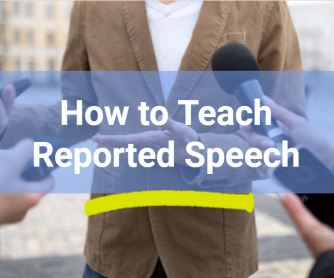Also known as Indirect Speech, Reported Speech is essential in everyday spoken English to basically “report” on what another person has said.
Whether we are relaying a message or simply repeating what someone said, there are countless situations in which we might use reported speech, so ESL students must be taught and encouraged to master it. Still, we mustn’t forget that it must be learned in context, so students understand both how and when to use it. For practical purposes, this article will cover only the cases in which the reporting verb is in the past (said, told, etc.,) which leads us to take the verb in the reported clause one step back into the past.
In short, you'll be able to explain to students that in reported speech:
- Quotation marks are removed from direct speech
- After the word "said", "that" then follows, e.g. Mary said that she was going to the store.
- Verbs take the past tense
Teaching Reported Statements
-
1
Teach what happens when direct speech is in present
Ask students what they usually do on weekends.
S1: I play football with friends.
S2: I visit my grandmother.
S3: I go to the movies.Show them how to “report”: Juan said he played football with friends. Separate the board into two sides; write the sentence in direct speech (use quotation marks) on one side and sentence in reported speech on the other side. Make sure students understand that the verb in simple present was changed to simple past, and the reason is that the reporting verb is in the past.
Report on what several students said about their usual weekend activities. Then, ask students to continue reporting.
Finally, report on what they said, but make mistakes; ask students to correct you.
T: Juan said he played volleyball with friends.
S: I said I played football with friends. -
2
Teach what happens when direct speech is in Present Continuous
Ask students what they are doing for the holidays.
S1: I’m going to Mexico.
S2: I’m spending the holidays at my grandmother’s.Show them how to report: Juan said he was going to Mexico. Write the sentence in direct speech on the board, and the reporting sentence right next to it. Make sure students understand that the verb in present continuous was changed to past continuous.
Report on what several students said about their plans for the holidays. Then, ask students to continue reporting on what their classmates said.
Finally, report on what they said, but make mistakes; ask students to correct you.
T: Juan said he was staying in Ontario.
S: I said I was going to Mexico. -
3
Teach what happens when direct speech is in past
Ask students what they did last weekend.
S1: I saw “Harry Potter and the Deathly Hallows”.
S2: I went shopping for Christmas gifts.Show them how to report: Juan said he had gone Christmas shopping. Write the sentence in direct speech on the board, and the reporting sentence right next to it. Make sure students understand that the verb in simple past was changed to past perfect.
Report on what your students said about their weekend. Then, ask students to continue reporting on what their classmates said.
Finally, report on what they said, but make mistakes; ask students to correct you.
T: Juan said he had gone shopping for groceries.
S: I said I had gone shopping for Christmas gifts. -
4
Teach what happens with the other tenses one by one
In the same manner illustrated above for the simple present, present continuous, and simple past, teach students how to report each of these tenses:
- Past continuous – changes to past perfect continuous
- Present perfect – changes to past perfect
- Past perfect – remains past perfect
- Past perfect continuous – remains the same
- Will – changes to would
- Can – changes to could
- Have to – changes to had to
It is recommended that you present a context, or specific situation, for each tense before doing the reporting. For example, for “can”, ask students to give examples of things they can do. For the present perfect, ask students to imagine they’re all working together in an office, and ask them to say what things they've already done and which they haven’t done yet.
-
5
Practice all tenses in reported speech
Ask students questions, making sure you do so in different tenses. Once the student has answered you, ask another to report on what he or she said.
T: Sarah, what do you want for Christmas?
S1: I want an iPhone.
T: Juan, what did she say?
S2: She said she wanted an iPhone.
Try these Reported Speech pictures for extended practice. They can be cut into cards for fun games! There are lots more great worksheets in our Reported Speech Section.
If you have any activities that worked for you, feel free to share them below!
P.S. If you enjoyed this article, please help spread it by clicking one of those sharing buttons below. And if you are interested in more, you should follow our Facebook page where we share more about creative, non-boring ways to teach English.








